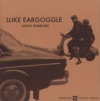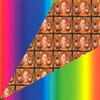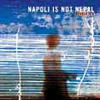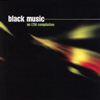- Michael Patrick Brady
- Albums and Singles
 The Mountaineers have an intriguing style that seems to blend a downhome, foot tapping folk sing along with modern electro-pop techniques,no doubt a product of the past and present influences of their Welshupbringing. At the heart of their songs lies the jangly acoustic soundsof a guitar that might just be a little ragged, the kind that mightmake an appearance around a campfire after everyone's gotten a littleloose. From there, electronic beeps and slurs are used like garnish,never overpowering the heart of the songs, but working along with it,adding new layers of sound and melody to the already tunefulcompositions. "Self Catering" is a bright track that shows offmultitrack harmonies and taut, precise beats that are found throughoutthe EP. "Clap in Time" begins with a windy horn introduction beforegiving way to a cricket chirp of electronic beeps and the song's body,where the singers ask you to do as the title suggests. It's strange,but the electronic chirps, once again give that feeling of a campfiresing-a-long (and clap-a-long), albeit one that is being experiencedthrough a filter of software and ingenuity. "Chicken" is a raucous,stomping song with the words gushing from the singer's mouth andfollowing down the cascading progression before shooting back up to thetop in a strained yelp. "Radio Cat" is the most adventurous track, asgoes for total programmed abstraction, floating around onelectronically processed vocals and a fuzzy programmed beat. The trackis then manipulated and cut up with sudden, jerky clips. Still, itretains a certain swing that the Mountaineers drop into every track.It's not o sterile that you can't swivel your hips, or maybe walk witha little strut as it plays on your mental soundtrack. "Camped Out"features a gorgeous chorus with an excellent harmony that comes throughlike a slightly out of range radio broadcast from the past. "Your Gunnis Sett on Me" is a light guitar piece of obliquely longing lyrics like"If you're gonna step on me / you gotta give it / you heal thisinjury." Hidden behind this is the unlisted "Fuck You in the Eye," andwhile obviously a throwaway fun track, I wouldn't be surprised to seethe music recycled into something more legitimate in the future. Theway in which the Mountaineers use their conventional instruments,classical piano, guitar, in a manner that is perfectly agreeable totheir use of electronic instruments and production techniques, makesthe EP an alluring listen.
The Mountaineers have an intriguing style that seems to blend a downhome, foot tapping folk sing along with modern electro-pop techniques,no doubt a product of the past and present influences of their Welshupbringing. At the heart of their songs lies the jangly acoustic soundsof a guitar that might just be a little ragged, the kind that mightmake an appearance around a campfire after everyone's gotten a littleloose. From there, electronic beeps and slurs are used like garnish,never overpowering the heart of the songs, but working along with it,adding new layers of sound and melody to the already tunefulcompositions. "Self Catering" is a bright track that shows offmultitrack harmonies and taut, precise beats that are found throughoutthe EP. "Clap in Time" begins with a windy horn introduction beforegiving way to a cricket chirp of electronic beeps and the song's body,where the singers ask you to do as the title suggests. It's strange,but the electronic chirps, once again give that feeling of a campfiresing-a-long (and clap-a-long), albeit one that is being experiencedthrough a filter of software and ingenuity. "Chicken" is a raucous,stomping song with the words gushing from the singer's mouth andfollowing down the cascading progression before shooting back up to thetop in a strained yelp. "Radio Cat" is the most adventurous track, asgoes for total programmed abstraction, floating around onelectronically processed vocals and a fuzzy programmed beat. The trackis then manipulated and cut up with sudden, jerky clips. Still, itretains a certain swing that the Mountaineers drop into every track.It's not o sterile that you can't swivel your hips, or maybe walk witha little strut as it plays on your mental soundtrack. "Camped Out"features a gorgeous chorus with an excellent harmony that comes throughlike a slightly out of range radio broadcast from the past. "Your Gunnis Sett on Me" is a light guitar piece of obliquely longing lyrics like"If you're gonna step on me / you gotta give it / you heal thisinjury." Hidden behind this is the unlisted "Fuck You in the Eye," andwhile obviously a throwaway fun track, I wouldn't be surprised to seethe music recycled into something more legitimate in the future. Theway in which the Mountaineers use their conventional instruments,classical piano, guitar, in a manner that is perfectly agreeable totheir use of electronic instruments and production techniques, makesthe EP an alluring listen.Read More
- Michael Patrick Brady
- Albums and Singles
 When I was seven years old, I received a rather exciting Christmaspresent, or at least it was exciting to me at that young age. It was aYamaha PSR-6 keyboard, with 99 special effect voices (including theever popular 'Machine Gun' and 'Ocean Wave') and 16 different styles ofbeat! Imagine the possibilities that were available to me, the things Icould do with so many features and options. It was an orchestra in abulky black casing, just awaiting the twitch of my conductor's baton.In reality, my seven-year-old virtuosity was capable only of hitting'Samba' and then goofing around with the funny noises. I am reminded ofthis warm childhood memory because Cut Out's "Interlude with FunMachine" sounds to me like it was put together by a group of seven yearolds with PSR-6's. Had I only known then that I could have recordedmyself (with that little thirty-second memory button?) and put out analbum. It honestly sounds, to my ears, as if every loop, beat, andvoice was drawn from this device and then sprinkled with a littlestudio work. The album's opener, "At It Again" goes on for five minuteswith only five seconds worth of music. "The Power Brokers" is theclosest to breaking from the unfortunate Yamaha sound, with drippyeffects, original beats and a bright organ loop that does not overstayits welcome. The track is relatively and thankfully brief. "Theme FromFun Machine, Part I," however, is an exercise in endurance, clocking inas the longest song on the album, though not by much. It's ten minutesand nineteen seconds of the 'March' beat with a rising and falling tonethat sounds like an advanced slide whistle synthesizer. I just keptthinking to myself, 'What could justify ten minutes of this?' In ashorter context, the ideas that Cut Out had for this piece may haveworked, however throughout the long (long) course of "Fun Machine,"they are repeated until your mind becomes desensitized to the audiowavelengths and you forget you're listening to anything at all. Thefinal song, "Fin" does come across well, with a mournful organ thatdrones on darkly, actually managing to evoke a mood or a feeling ratherthan just looping a tinny beat. Its ending is abrupt, but keeping itshort and knowing when to get out is a virtue that would have improvedthe rest of this disc immensely. "Interlude with Fun Machine" suffersfrom a dearth of ideas, and lacks sufficient style to hide that fact.Did they take the name Cut Out as an allusion to the cut out bin? Ihave a suggestion. If you're of a certain age range, chances are thatyou too received a PSR-6, popular among budding grade school musicians,at some point in your childhood. If it happens to be kicking aroundyour basement somewhere, I suggest you dig it out, dust it off, and hitthe 'demonstration' button. That song was always a lot of fun. It waslong, but at least it had variations.
When I was seven years old, I received a rather exciting Christmaspresent, or at least it was exciting to me at that young age. It was aYamaha PSR-6 keyboard, with 99 special effect voices (including theever popular 'Machine Gun' and 'Ocean Wave') and 16 different styles ofbeat! Imagine the possibilities that were available to me, the things Icould do with so many features and options. It was an orchestra in abulky black casing, just awaiting the twitch of my conductor's baton.In reality, my seven-year-old virtuosity was capable only of hitting'Samba' and then goofing around with the funny noises. I am reminded ofthis warm childhood memory because Cut Out's "Interlude with FunMachine" sounds to me like it was put together by a group of seven yearolds with PSR-6's. Had I only known then that I could have recordedmyself (with that little thirty-second memory button?) and put out analbum. It honestly sounds, to my ears, as if every loop, beat, andvoice was drawn from this device and then sprinkled with a littlestudio work. The album's opener, "At It Again" goes on for five minuteswith only five seconds worth of music. "The Power Brokers" is theclosest to breaking from the unfortunate Yamaha sound, with drippyeffects, original beats and a bright organ loop that does not overstayits welcome. The track is relatively and thankfully brief. "Theme FromFun Machine, Part I," however, is an exercise in endurance, clocking inas the longest song on the album, though not by much. It's ten minutesand nineteen seconds of the 'March' beat with a rising and falling tonethat sounds like an advanced slide whistle synthesizer. I just keptthinking to myself, 'What could justify ten minutes of this?' In ashorter context, the ideas that Cut Out had for this piece may haveworked, however throughout the long (long) course of "Fun Machine,"they are repeated until your mind becomes desensitized to the audiowavelengths and you forget you're listening to anything at all. Thefinal song, "Fin" does come across well, with a mournful organ thatdrones on darkly, actually managing to evoke a mood or a feeling ratherthan just looping a tinny beat. Its ending is abrupt, but keeping itshort and knowing when to get out is a virtue that would have improvedthe rest of this disc immensely. "Interlude with Fun Machine" suffersfrom a dearth of ideas, and lacks sufficient style to hide that fact.Did they take the name Cut Out as an allusion to the cut out bin? Ihave a suggestion. If you're of a certain age range, chances are thatyou too received a PSR-6, popular among budding grade school musicians,at some point in your childhood. If it happens to be kicking aroundyour basement somewhere, I suggest you dig it out, dust it off, and hitthe 'demonstration' button. That song was always a lot of fun. It waslong, but at least it had variations. Read More
- Administrator
- Albums and Singles
 I grew up a military brat and spent seven of my most formative years inGermany. At the time, I was a total b-boy, listening to classic hip hopthat was on the charts, like Run DMC, Beastie Boys, and Kool Moe Dee. Ihated rock music and wanted nothing to do with it. At the same time, Iwas being introduced to new music through a number of friends andacquaintances. During this time I heard my first taste of Kraftwerk,and the industrial electronics of any West German metropolis. It waskeyboard tones, glitch beats, and the low rumbles of electronic voicesand bass tones. Back then, we didn't really care what there was todance to, as long as we could dance to it. We'd bug out and breakdanceand robot to anything with a beat, which always seemed to amuse theteachers and parents. Secretly, we wanted to know where this music wasmade, as it always felt like it was being made by machines with AI soadvanced they knew just what could make us boogie; and we chastisedAmerican artists who did anything that used similar sounds, from HaroldFaltermeyer to Herbie Hancock, labelling them "posers" like they werestreet punks who didn't know any better. How wrong we were when we werejust reaching adolescence, but how easy it is for a record to bring allthat rushing back. Luke Eargoggle, one of the new gods of robotelectro, displays a clever range of styles all with the same palette onAudio Warriors,and it's a cheeky listen that got me right back to 1983. Each songbounces with energy of a classic sound with updated technology. Fromthe start, you want to move to it, dancing around the room like youjust don't care. "I want to be free to do what I want," says Luke, andit's like an anthem for body-moving. Different rhythms, but all withthat hip-hop style and electronic production, frame each track, asswirls and bumps highlight the computerized vocals that sometimescontain real lyrics and sometimes just exclaim ("Yeah, yeah!"). There'sreally not much more than that to this, but the music begs for thatkind of minimalism. It truly feels like Eargoggle's overjoyed layingthis to tape or hard drive. That energy is catching, and it's been along time since I had this much fun.
I grew up a military brat and spent seven of my most formative years inGermany. At the time, I was a total b-boy, listening to classic hip hopthat was on the charts, like Run DMC, Beastie Boys, and Kool Moe Dee. Ihated rock music and wanted nothing to do with it. At the same time, Iwas being introduced to new music through a number of friends andacquaintances. During this time I heard my first taste of Kraftwerk,and the industrial electronics of any West German metropolis. It waskeyboard tones, glitch beats, and the low rumbles of electronic voicesand bass tones. Back then, we didn't really care what there was todance to, as long as we could dance to it. We'd bug out and breakdanceand robot to anything with a beat, which always seemed to amuse theteachers and parents. Secretly, we wanted to know where this music wasmade, as it always felt like it was being made by machines with AI soadvanced they knew just what could make us boogie; and we chastisedAmerican artists who did anything that used similar sounds, from HaroldFaltermeyer to Herbie Hancock, labelling them "posers" like they werestreet punks who didn't know any better. How wrong we were when we werejust reaching adolescence, but how easy it is for a record to bring allthat rushing back. Luke Eargoggle, one of the new gods of robotelectro, displays a clever range of styles all with the same palette onAudio Warriors,and it's a cheeky listen that got me right back to 1983. Each songbounces with energy of a classic sound with updated technology. Fromthe start, you want to move to it, dancing around the room like youjust don't care. "I want to be free to do what I want," says Luke, andit's like an anthem for body-moving. Different rhythms, but all withthat hip-hop style and electronic production, frame each track, asswirls and bumps highlight the computerized vocals that sometimescontain real lyrics and sometimes just exclaim ("Yeah, yeah!"). There'sreally not much more than that to this, but the music begs for thatkind of minimalism. It truly feels like Eargoggle's overjoyed layingthis to tape or hard drive. That energy is catching, and it's been along time since I had this much fun. Read More
- Administrator
- Albums and Singles
 At the very least, the sound of Lazarus's lazy drawl and deliveryindicates someone who just woke up in the morning, if not actuallyrising from the dead. Guitars are plucked deliberately, syllables areenunciated slowly, and the music proceeds ploddingly. Sometimes it is arace between Montgomery's drawl and his guitar to see which can proceedmore slowly. Often they are neck and neck, two tortoises fumblingtowards a far-off finish line. The scratchiness of the vocals screamsfor a glass of water to dispel those early morning frogs in the throat.And on the fringes of the music are little electronic twiddlings which,at first, are more decorative than substantive but which eventuallycome to define the album. Lazarus is Trevor Montgomery, who has playedwith Tarentel and The Drift; this is his first solo album where heexplores some quiet acoustic compositions. The most unsettling (andfascinating) part of Lazarus's music is the ghostly background vocalswhich pop up in many songs. The background voice is a few octaveshigher than Montgomery's main voice, so it is hard to discern if it isthe same person singing them. But the background voice is alsochillingly more scratchy, unsteady, and frail. My impression was thatthere was a background banshee, rather than a human, singing. The firsthalf of the album maintains a monotony which is only broken by "Ocean(Burn the Highways)," a song which picks of the lagging pace and fillsin the space with some fine guitar plucking and a lively organ duringthe chorus. It also has the most unsettling instance of the backgroundbanshee vocals, where her voice threatens either to decomposealtogether or send us shivering to bed, curled up and frightened (thinkof the difference between Winona Ryder's characters in "EdwardScissorhands:" her young character in the film sounds normal, whereasher character as aged narrator has a geriatric, frail voice which stillmakes my hair bristle when I hear it). But the monotony persists in theother seven or so songs at the beginning of the album as they flowseamlessly into one another, not really making a name for themselves.Ironically, by the time the lovely short instrumental "(untitled)"comes about, Lazarus adds some interesting electronics to the limpingacoustics to spruce up the sound. The highlight of this is heard at theend of "Obviust" when vocals are overtaken by the more compellingelectronic frequency noodling. The last four songs are the mostcaptivating of the album, forecasting a darkness and a vision so bleakthat another resurrection might be in order.
At the very least, the sound of Lazarus's lazy drawl and deliveryindicates someone who just woke up in the morning, if not actuallyrising from the dead. Guitars are plucked deliberately, syllables areenunciated slowly, and the music proceeds ploddingly. Sometimes it is arace between Montgomery's drawl and his guitar to see which can proceedmore slowly. Often they are neck and neck, two tortoises fumblingtowards a far-off finish line. The scratchiness of the vocals screamsfor a glass of water to dispel those early morning frogs in the throat.And on the fringes of the music are little electronic twiddlings which,at first, are more decorative than substantive but which eventuallycome to define the album. Lazarus is Trevor Montgomery, who has playedwith Tarentel and The Drift; this is his first solo album where heexplores some quiet acoustic compositions. The most unsettling (andfascinating) part of Lazarus's music is the ghostly background vocalswhich pop up in many songs. The background voice is a few octaveshigher than Montgomery's main voice, so it is hard to discern if it isthe same person singing them. But the background voice is alsochillingly more scratchy, unsteady, and frail. My impression was thatthere was a background banshee, rather than a human, singing. The firsthalf of the album maintains a monotony which is only broken by "Ocean(Burn the Highways)," a song which picks of the lagging pace and fillsin the space with some fine guitar plucking and a lively organ duringthe chorus. It also has the most unsettling instance of the backgroundbanshee vocals, where her voice threatens either to decomposealtogether or send us shivering to bed, curled up and frightened (thinkof the difference between Winona Ryder's characters in "EdwardScissorhands:" her young character in the film sounds normal, whereasher character as aged narrator has a geriatric, frail voice which stillmakes my hair bristle when I hear it). But the monotony persists in theother seven or so songs at the beginning of the album as they flowseamlessly into one another, not really making a name for themselves.Ironically, by the time the lovely short instrumental "(untitled)"comes about, Lazarus adds some interesting electronics to the limpingacoustics to spruce up the sound. The highlight of this is heard at theend of "Obviust" when vocals are overtaken by the more compellingelectronic frequency noodling. The last four songs are the mostcaptivating of the album, forecasting a darkness and a vision so bleakthat another resurrection might be in order. Read More
- Administrator
- Albums and Singles
 After a few years in which only a handful of Merzbow albums seemed toemerge, the typically prolific Masami Akita has returned to histraditional, aggressive release schedule. Having overcome theexhaustion associated with the fifty CD Merzbox, the past six months have offered a plethora of new material, including Frog, Merzbeat, Merzzow, the collaboration with Pan Sonic, and the Russell Haswell collaboration Satanstornade.Finally, Ant-Zen has stepped into the ring with this cleverly packaged4x3" CD set. Each disc offers a bite-sized portion of the diverselynoisy flavors of Merzbow's modern noise compositions. The ferocious"Warhorse" opens this collection with a wailing guitar loop that soonsubmits to the cacophony of abstract percussion and sizzlingsoundscapes. Far removed from his earlier work a la Music For Bondage Performance,the piece hits like an air raid and offers little relief through its 21minute duration. In contrast, the second CD opens with the minimal yetbassy rumblings of "Space Trackin," whose somewhat rhythmic structureexperiences constant interruption from static-laden frequencies. Itstays relatively consistent until roughly the last minute, evolvinginto a squeaky filtered bleep-beat experiment. The accompanying"Ramatam" combines a white hot sheet of electronics with hard rockdrums before yielding to the sounds of burning hard drives. Disc threecomes from the same mindset, if not the same recording sessions, of theMerzbeat project. Of the two tracks here, "Stone The Crow"appeals to me more with its steady, sludgy rock backbeat churning underan array of dominant, menacing squeals and hisses. The final CD soundsmost like an Ant-Zen release. From the onset of "CD Hunter," a reworkof the previously-available "AB Hunter," a muffled rhythm lays thefoundation for stream upon stream of digital noise. After giving allfour discs a good listen, it has become clear to me that Merzbow isreleasing some of the most creative and interesting work of his entirecareer.
After a few years in which only a handful of Merzbow albums seemed toemerge, the typically prolific Masami Akita has returned to histraditional, aggressive release schedule. Having overcome theexhaustion associated with the fifty CD Merzbox, the past six months have offered a plethora of new material, including Frog, Merzbeat, Merzzow, the collaboration with Pan Sonic, and the Russell Haswell collaboration Satanstornade.Finally, Ant-Zen has stepped into the ring with this cleverly packaged4x3" CD set. Each disc offers a bite-sized portion of the diverselynoisy flavors of Merzbow's modern noise compositions. The ferocious"Warhorse" opens this collection with a wailing guitar loop that soonsubmits to the cacophony of abstract percussion and sizzlingsoundscapes. Far removed from his earlier work a la Music For Bondage Performance,the piece hits like an air raid and offers little relief through its 21minute duration. In contrast, the second CD opens with the minimal yetbassy rumblings of "Space Trackin," whose somewhat rhythmic structureexperiences constant interruption from static-laden frequencies. Itstays relatively consistent until roughly the last minute, evolvinginto a squeaky filtered bleep-beat experiment. The accompanying"Ramatam" combines a white hot sheet of electronics with hard rockdrums before yielding to the sounds of burning hard drives. Disc threecomes from the same mindset, if not the same recording sessions, of theMerzbeat project. Of the two tracks here, "Stone The Crow"appeals to me more with its steady, sludgy rock backbeat churning underan array of dominant, menacing squeals and hisses. The final CD soundsmost like an Ant-Zen release. From the onset of "CD Hunter," a reworkof the previously-available "AB Hunter," a muffled rhythm lays thefoundation for stream upon stream of digital noise. After giving allfour discs a good listen, it has become clear to me that Merzbow isreleasing some of the most creative and interesting work of his entirecareer.Read More
- Administrator
- Albums and Singles
 Neon Hunk walks the line between quirky and totally annoying. They playtwisted jerky rock music that was probably inspired partly by Boredomsbut is nowhere near as fun. Certainly their garish artwork seemsgreatly in debt to Yamantaka Eye, but like the music it seems a littlediluted. I bet they like the Residents a bit too. Brutalism withkittens might mess up kitchen table if the totally distortedsynthesisers don't mess up the lettuce first and the clattering drumscould probably crush your tomato at fifty paces. I can't really say Ilike this album or don't like it, it just kind of craps about like aflappy kid who tries too hard and knocks everything over while I trynot to get annoyed that I'm not listening to Boredoms instead, and endup mixing metaphors instead of chopping up Robert Sandell from 'MixingIt' on Radio 3 to feed to my pack of hounds who all sound a bit likeXTC but not really and the rest of the CD is quite different and notvery good in actual fact. Not in this HC fact though, its all of thesame quality with a super-dumb drummer who clatters off a bit behindthroughout but that's his minimal charm. Mothmaster seems to be after afingernails-on-chalkboard sound on the synth but falls just short ofutter shrillness. Sometimes they even fuck about playing the tapesbackwards. Its like they wanted the lunatics to take over the asylumbut only got the toytown version with Larry the Lamb and Noddy jinglingbells all night until their mums shouted at them to shut the fuck up.The quasi-songs threaten to fall apart any minute but are usually overjust before that happens. The album is also really short, which mightbe a blessing in disguise but could be one good reason not to shell outfull price for it, if I haven't already put you off. Like Pink andBrown,they give their tracks humourous titles that aren't really very funny,but who cares what the songs are called anyway? They might be quiteamusing to catch live if they pull off silly moves to match the twistsand turns of the gargled unintelligible babbling screeching vocals.Neon Hunk seems like a one trick pony one leg short, but you might keepit around out of some kind of misguided pity. Someone should flog thislot to the Hoxton trendies fast, while they wait for an exciting newband called Radio 2 to pretend they wrote an old Gang of 2 song, whilstnot mentioning that wave, punk and core are now acceptable to theafternoon teatime set. At least Jonathan Ross will never play Neon Hunkon the radio, and that's the immoral of this sordid abortion. Don'teven think about getting this until you have the ultra heavy killerNoxagt album on Load. Fuck Neon Hunk, they couldn't even be bothered toget a classically trained viola player in the band, and what good isthat?
Neon Hunk walks the line between quirky and totally annoying. They playtwisted jerky rock music that was probably inspired partly by Boredomsbut is nowhere near as fun. Certainly their garish artwork seemsgreatly in debt to Yamantaka Eye, but like the music it seems a littlediluted. I bet they like the Residents a bit too. Brutalism withkittens might mess up kitchen table if the totally distortedsynthesisers don't mess up the lettuce first and the clattering drumscould probably crush your tomato at fifty paces. I can't really say Ilike this album or don't like it, it just kind of craps about like aflappy kid who tries too hard and knocks everything over while I trynot to get annoyed that I'm not listening to Boredoms instead, and endup mixing metaphors instead of chopping up Robert Sandell from 'MixingIt' on Radio 3 to feed to my pack of hounds who all sound a bit likeXTC but not really and the rest of the CD is quite different and notvery good in actual fact. Not in this HC fact though, its all of thesame quality with a super-dumb drummer who clatters off a bit behindthroughout but that's his minimal charm. Mothmaster seems to be after afingernails-on-chalkboard sound on the synth but falls just short ofutter shrillness. Sometimes they even fuck about playing the tapesbackwards. Its like they wanted the lunatics to take over the asylumbut only got the toytown version with Larry the Lamb and Noddy jinglingbells all night until their mums shouted at them to shut the fuck up.The quasi-songs threaten to fall apart any minute but are usually overjust before that happens. The album is also really short, which mightbe a blessing in disguise but could be one good reason not to shell outfull price for it, if I haven't already put you off. Like Pink andBrown,they give their tracks humourous titles that aren't really very funny,but who cares what the songs are called anyway? They might be quiteamusing to catch live if they pull off silly moves to match the twistsand turns of the gargled unintelligible babbling screeching vocals.Neon Hunk seems like a one trick pony one leg short, but you might keepit around out of some kind of misguided pity. Someone should flog thislot to the Hoxton trendies fast, while they wait for an exciting newband called Radio 2 to pretend they wrote an old Gang of 2 song, whilstnot mentioning that wave, punk and core are now acceptable to theafternoon teatime set. At least Jonathan Ross will never play Neon Hunkon the radio, and that's the immoral of this sordid abortion. Don'teven think about getting this until you have the ultra heavy killerNoxagt album on Load. Fuck Neon Hunk, they couldn't even be bothered toget a classically trained viola player in the band, and what good isthat? Read More
- Administrator
- Albums and Singles
 The mix of smooth-jazz and four-on-the-floor beats on this new full-length is rather bland on this release from Shitkatapult, who is more commonly known for excellent releases that are usually somewhere between airy and desolate beat-driven songs and flat out boogie down, break out the boom box party pleasers. The grooves on Revolv_er do not always connect, however and I'm left feeling disappointed by its combo of live and electronic sounds.Shitkatapult
The mix of smooth-jazz and four-on-the-floor beats on this new full-length is rather bland on this release from Shitkatapult, who is more commonly known for excellent releases that are usually somewhere between airy and desolate beat-driven songs and flat out boogie down, break out the boom box party pleasers. The grooves on Revolv_er do not always connect, however and I'm left feeling disappointed by its combo of live and electronic sounds.Shitkatapult
"A Night Outside in the Bunker" opens the album with an uninviting belch: the rhythms are clean and fun and then the live instruments begin to ruin everything in a smattering of jazz-like flourishes. Thankfully "Electrobastard" and "This World Is Sound" are more inviting. The latter ends up as a distorted ballad of sorts full of wonderful harmonies and it is backed by completely scathing beat. It's unfortunate that nearly everything goes awry from there on. "Annie Opper" is a great sound collage but is only a brief twenty-four second excursion while "Bangkok" is a nice song, but only nice. Its influences were all too obvious to me and this ruined the effect I think it was intended to have. "Selma" begins promisingly and then that live piano messes everything up: basically destroying the subtle mood that was established so flawlessly and smoothly at the beginning. This turns out to be a contagious problem that haunts most of the songs. Everything on the album just ends up sounding mediocre as a result. I can understand why Shitkatapult released this album, though—there are some fantastic beats and melodies here reminiscient of other performers on the label—but it has an almost overly clean gloss to it that leaves me feeling as if six consecutive days of listening to Merzbow or Whitehouse is a good idea. 
Read More
- Administrator
- Albums and Singles
 Whether one enjoys these label-sampler compilations depends mostly onhow one's taste agrees with that of the person who runs the label.There are no record labels whose taste I agree with 100%, but I like alot of what LTM does, enough to keep me interested in what label-bossJames Nice decides to issue next. This CD compiles tracks from therecent batch of LTM releases with a few otherwise unreleased songs tosucker in the completists. Hell, it works for me, why not. LTM and itssub-label Boutique seem to have several related missions: to reissuemusic originally released by Factory (other than the bigshots, JoyDivision, Durutti Column, and New Order) to music by bands who might atsome point have had a record (even just a 7") on Factory, and torelease new music by bands who were on Factory long ago and are eitherstill going or who have been ressurected due to Nice's enthusiasm. Oneof those bands, Crispy Ambulance, has donated a live album from thierreunion tour as a bonus CD that comes free with the first run of "BlackMusic" CDs.
Whether one enjoys these label-sampler compilations depends mostly onhow one's taste agrees with that of the person who runs the label.There are no record labels whose taste I agree with 100%, but I like alot of what LTM does, enough to keep me interested in what label-bossJames Nice decides to issue next. This CD compiles tracks from therecent batch of LTM releases with a few otherwise unreleased songs tosucker in the completists. Hell, it works for me, why not. LTM and itssub-label Boutique seem to have several related missions: to reissuemusic originally released by Factory (other than the bigshots, JoyDivision, Durutti Column, and New Order) to music by bands who might atsome point have had a record (even just a 7") on Factory, and torelease new music by bands who were on Factory long ago and are eitherstill going or who have been ressurected due to Nice's enthusiasm. Oneof those bands, Crispy Ambulance, has donated a live album from thierreunion tour as a bonus CD that comes free with the first run of "BlackMusic" CDs.I don't love all of this, of course. My taste runs more towards thelate 70s/early 80s industrial post-punk sounds, so the tracks here byDepartment S (a foot-tapping punk-disco anthem called "Going LeftRight") , the amorphous fuzz noises by Ludus (one of the exclusivetracks), and especially Crawling Chaos and Artery's skewed punkappealled to me. The comp is successful in that it's certainly got myinterest enough to seek out more CDs by these bands, which areforthcoming in the months ahead. The reunited Crispy Ambulance and theproject currently calling itself the Wake (now a duo containing onlyone original member) sound tired and reaching, not particularly asinspired as those bands early 1980s music. The Graham Massey (of BitingTongues and 808 State) remix of a newer Crispy song just plods alongwith seemingly random effects and some movie samples...
- Crawling Chaos - Arabesque
- Ludus Rosa - Luxemburg
- Section 25 - Part Primitiv
Read More
- Administrator
- Albums and Singles
 Listening to the overtly Eastern influenced percussion Angus Maclise plays on parts of this double CD, I can't help thinking that replacing him with Mo Tucker might've been the best thing that ever happened to the Velvet Underground. They're such different drummers, almost opposites, that you suspect Lou Reed had totally had enough of the hippy dippy guy who'd turn up to play gigs half an hour late and then carried on playing half an hour after the rest of the band finished. Tucker's monotonous tub thump became such a signature of that band that it's hard to imagine them any other way.Sub Rosa
Listening to the overtly Eastern influenced percussion Angus Maclise plays on parts of this double CD, I can't help thinking that replacing him with Mo Tucker might've been the best thing that ever happened to the Velvet Underground. They're such different drummers, almost opposites, that you suspect Lou Reed had totally had enough of the hippy dippy guy who'd turn up to play gigs half an hour late and then carried on playing half an hour after the rest of the band finished. Tucker's monotonous tub thump became such a signature of that band that it's hard to imagine them any other way.Sub Rosa
Maclise died almost exactly 24 years ago out in Nepal. Over the last few years this marginal character has been exhumed for public display with a bunch of archive recordings that reveal a curious dabbling with everything from meditative hand percussion to beatnik poetry to electronic tape splice composition. This selection from a much larger cache of recordings rediscovered by Exploding Plastic Inevitable whip cracker Gerard Malanga covers all points, but is intended only for those who want to dig deeper than the festive Oriental tribal music featured on the earlier release Invasion of Thunderbolt Pagoda. The most impressive selections here are probably the early 'electronics' compositions "Electronic Mix For 'Expanded Cinema'" and "Tunnel Music." "Electronic Mix" exhumes eerie drone flailed at by babbling radiophonic shrapnel and for almost half an hour transcends the shoddy audio quality. Most of the music is rendered quaint and distant by poor mushy recordings, like faded photos that maybe muddy memory as much as clarify.
This is an album that could only be recommednded to people who are fairly obsessive about this whole late sixties New York loft drone scene. Tony Conrad and John Cale collaborate on some tracks, but you'd be better advised to check out their releases on Table of the Elements before getting this. There are two poetry recitals included, and Maclise has a friendly welcoming vocal presence. "Description of a Mandala" has some nice cut up images, but the twenty minutes of "Universal Solar Calendar," where he gave a name to every day of the year reeks of tired hippy dogends and quickly gets tedious. Another half hour instrumental, "Thunder Cut," features a loop of a thunder recording made by Tony Conrad, but everyone else seems to be playing completely out of time with it. You wouldn't even realise it was thunder if it wasn't documented in the booklet. Some of the recordings, such as "Two Speed Trance" are so lo-fi that their character has probably altered entirely, paying Maclise a diservice.
If you don't mind mangled squished violins and cracked cimbalums partially bled by years of magnetic corrosion and recording limitations, and really want to hear every last gasp of a guy who left the Velvet Underground not too soon, then this is the double disc you've been waiting for. Those who are a bit less obsessive about the historical angle might just be left thinking that some ghosts are better left to rest. Mostly this sounds like some hippy farting about. There's nothing wrong with that in itself, but its questionable how many people really need to hear it many years later when there are so many better contemporary recordings around. Nothing left now but the recordings, fading slow.
samples:
Read More
- Administrator
- Albums and Singles
 Further into the Angelika Koehlermann riddle, here is a release thatsurprised me by actually not being that bad. It's not really that good,either. However, I'm surprised that a release like this made it onto alabel that seems proud of its unbroken record of pure, unadulteratedsilly crap. B.O.S. is an Austrian trio whose sound is informed both byKrautrock and by current German lap-pop like The Notwist and Lali Puna.B.O.S.' songs use the classic Can formula: a dark, insistent bassrhythm that repeats ad infinitum, to which is added instrumental andpercussion overdubs, trance-inducing vocals, and galaxy of spaceyeffects. B.O.S. alternately use simple guitar chords, trumpet,clarinet, harp, toy percussion and burbling electronics to round outtheir kosmische music. None of these instruments are played with muchskill or virtuosity, but that's really not the point, is it? They havequite a knack for writing a pop hook, as well, even if you can't reallydecipher what the vocalist is singing. As a first release, O-Land showsa lot of promise. There's nothing terribly inventive about a song like"Bring Back," but it does have a passable atmosphere and a rathercatchy melody that make for an engaging listen. Unlike Ted Minsky andBoulder dDash, this album does not have me sprinting for the ejectbutton. Will the Angelika Koehlermann riddle ever be solved? I thinkAngelika herself sums it up best when she says "[My friend Gerhard]stopping swimming after an accident. He's finally like sinking to thebottom of his lonely life. I also try to get home in a way. I had ahouse some times ago, but one day, I went there, and the house haddisappeared." There is absolutely nothing I can add to that statement.
Further into the Angelika Koehlermann riddle, here is a release thatsurprised me by actually not being that bad. It's not really that good,either. However, I'm surprised that a release like this made it onto alabel that seems proud of its unbroken record of pure, unadulteratedsilly crap. B.O.S. is an Austrian trio whose sound is informed both byKrautrock and by current German lap-pop like The Notwist and Lali Puna.B.O.S.' songs use the classic Can formula: a dark, insistent bassrhythm that repeats ad infinitum, to which is added instrumental andpercussion overdubs, trance-inducing vocals, and galaxy of spaceyeffects. B.O.S. alternately use simple guitar chords, trumpet,clarinet, harp, toy percussion and burbling electronics to round outtheir kosmische music. None of these instruments are played with muchskill or virtuosity, but that's really not the point, is it? They havequite a knack for writing a pop hook, as well, even if you can't reallydecipher what the vocalist is singing. As a first release, O-Land showsa lot of promise. There's nothing terribly inventive about a song like"Bring Back," but it does have a passable atmosphere and a rathercatchy melody that make for an engaging listen. Unlike Ted Minsky andBoulder dDash, this album does not have me sprinting for the ejectbutton. Will the Angelika Koehlermann riddle ever be solved? I thinkAngelika herself sums it up best when she says "[My friend Gerhard]stopping swimming after an accident. He's finally like sinking to thebottom of his lonely life. I also try to get home in a way. I had ahouse some times ago, but one day, I went there, and the house haddisappeared." There is absolutely nothing I can add to that statement. Read More
- Administrator
- Albums and Singles
 Ted Minsky is actually Anne Grabow. Why has Anne Grabow chosen such a masculine moniker? Who is Anne Grabow? Who, for that matter, is Angelika Koehlermann? That's like asking who Betty Crocker is. Someone. Anyone. No one. And in the end, does it matter? What evidence can we glean from the press release? Nothing important, it seems, except that Ted Minsky is described alternately as a "young costume designer" and as a "super-architect" leading us "to the borders of pop music." This is pure hyperbole, I'm afraid.Angelika Koehlermann
Ted Minsky is actually Anne Grabow. Why has Anne Grabow chosen such a masculine moniker? Who is Anne Grabow? Who, for that matter, is Angelika Koehlermann? That's like asking who Betty Crocker is. Someone. Anyone. No one. And in the end, does it matter? What evidence can we glean from the press release? Nothing important, it seems, except that Ted Minsky is described alternately as a "young costume designer" and as a "super-architect" leading us "to the borders of pop music." This is pure hyperbole, I'm afraid.Angelika Koehlermann
Ms. Minsky/Grabow's musical travesty Madame Le Ted sounds something like a lobotomized Bjork recording songs onto a faulty four-track in a public bathroom stall. The dimly realized melodies and poorly mixed vocals are covered up with a bland palette of factory-preset distortion effects. The vocals are of the world-weary chanteuse, I-can't-be-bothered-to-actually-sing style. The lyrics are in a confounding combination of German, Spanish, and English. What shall we call this hybrid? Gerspanglish? Spangermlish? How about "annoying"? It's like a series of idiosyncratic in-jokes that nobody actually gets, not even Minsky herself. Songs with names like "Who Will Hold My Boobs?" promise humor and irony, but deliver only detached weirdness. Ted Minsky has an obsession with her own bodily self-image, which is explicated in the song "Proportional." This plays like a musical version of the comic strip Cathy. The desire to turn this music off is nearly irresistible. I think I'm going to give in.
Read More

